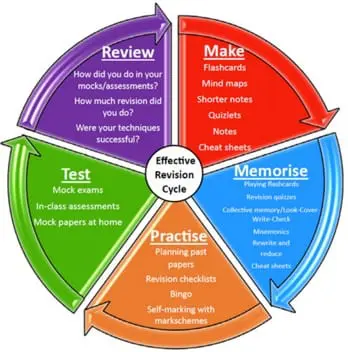GCSE and A Level courses all have exams at the end of the course. This means that there is a lot of information that you must be able to recall in an exam situation. To do this successfully, at the end of Y11 and the end of Y13, you must learn and practise memory and recall techniques throughout your school years.
Below is a guide to the Redhill Effective Revision Cycle to support you with your revision.
The Effective Revision Cycle
Effective revision is an ongoing process. At Redhill we believe that this should be made up of five stages as shown in the diagram. Continue reading below for details of how to make the most of each stage.

Make
Transfer the skills, knowledge and understanding you need for your exams into a revision resource that is easy to use. Possible strategies include:
- Flash cards
- Mind maps
- Cheat sheets
- Turn over cards
- Information Organisers
- Mnemonics
- Roman room / Greek loci
- Fold and flip
- Body pegs
Flash Cards
Flash cards are a small collection of information that has got all the key details carefully summarised.
Some key criteria for creating effective flashcards:
- Use colours to represent different things (e.g. red is for ideas you might forget, green for explanation, blue for statistics)
- Don’t use full sentences
- Underline keywords and spellings
- Use images if they help you to remember
Ideas of ways that you can use flash cards include:
- Keywords and definitions
- Questions and answers
- Exam questions and marks schemes
- Exam technique cards; ‘How to’ cards with a question and answer
Memorise
Dedicate explicit time to actively commit this information to memory.
Possible strategies include:
- Self/peer/parent testing
- Active retrieval (collective memory)
- Turn over games
- Leitner boxes
- Text to pictures
- Red/black pen.
Look, Cover, Write, Check
Sequencing
Leitner Boxes
Layering
Match-Up
Blurting
Practise
Revision needs to involve doing something. Do as many practise questions as you can. Ideally use exam questions for this.
Test
Regularly test yourself ideally with exam papers.
Review
Reflect on your performance in tests to help you identify the areas that you still need to work on.

